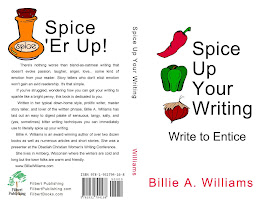The crime and its solution remain the mystery novel's backbone. Fleshing that crime out, relating all those pieces to the whole is what everything else is clarifying or relating to and should do for you, the mystery writer, or you, the mystery reader.
A mystery may be construed as a contest between the sleuth and reader. In the best case scenario, between reader vs. writer, the sleuth will know just before the reader does the solution creating an "aha" moment for the reader. "I should have known that, I should have seen that coming, what did I miss," are the usual reader reactions if you, the writer, have done your job.
Gillian Roberts in You Can Write a Mystery, (1999)says "The unraveling of the clues provides much of the basic framework of your novel."
She recommends trying to have one clue in each chapter. Of course, if your chapters are only 3 or 4 pages long this maybe unrealistic. However, it behooves you to plant enough clues to keep your reader engaged and searching for those clues like a game player in a game of Wheel of Fortune.
The red herrings reputation for diversion is not without caveat. Too many false clues, side trips, for your reader can get annoying and disrupt the flow of the novel and the reader's enjoyment. You may wind up on their "do not read" list.
A clue can be nearly anything. Did you know that 85% of all communication is nonverbal? Nonverbal communication, body language, especially to a detective, investigator or judge trained in reading what the person being questioned is not revealing via their body language is trusted more than words being said in answer to the questions they are asking.
If a suspect fidgets, cannon maintain eye contact or starts to have a redness washing up form his/her chest, to throat, to face—would you believe anything much of what they are verbalizing? Or would you read his/her body instead.
This wouldn't be enough to convict anyone and if you gave several of your characters flaws, inconsistencies, imperfections, they could divert attention from your clues or your criminal. A physical condition that makes a characters eyes blink continuously, more often than seems normal, could indicate misdirection, or lies. Or, it could also be just that a physical condition that causes this to happen in this particular person.
With cleverness and total recall, think "Colombo" here, a clue slipped in earlier, before it had any significance, becomes important. It could be the first few chapters of your novel sets those clues in place before the reader knows enough to notice them or their importance to the story. Or perhaps your sleuth will misinterpret the clue as June Fabrizio does in my novel Antique Armor when the armor seems bent on creating chaos and perhaps murder.
As you do this remember the saggy middle, the hard to hold up ignorable middle of anything from a long rope, long sentence, long paragraph, long list of things, what a great place to hide a clue in plain sight.
Whatever you do play fair with your reader and your sleuth. If you started out with a list of clues you wanted to incorporate into your novel, as some writers do, did you and were the clues tactfully disposed of by the end of the novel satisfying sleuth, the story and the reader?
One way to make sure you have tied up all those loose ends and revealed your clues, in the right spot ,to the right people, at the right time and place, is to print out your manuscript draft and highlight all the clues you've planted. Do any of them still need explanation or follow up?
Satisfying the died in the wool mystery fan is simply being true to the craft, and not leading him/her down a dead end path or to a solution of the whole mystery by the introduction of a fly on the wall at the end that had no place in the novel until that exact moment before you wrote THE END. Play fair, play clever, play with your clues but do not play with your reader, at least do not try to trick them. You want to retain a fan forever with your wit and wisdom and sometimes chutzpah.
Make your reading time absorbing. Pit your wits against the accidental sleuth, who may be in a job like yours. Subscribe to my free e-zine Mystery Readers and Working Writers, the free e-zine for mystery lovers. Get a free e-booklet “ A Nice Quiet Family” a very short/flash mystery. http://www.billiewilliams.com











3 comments:
Enjoyed the read, Billie. Planting clues and being fair to the reader are two things which give many beginning writers trouble. I've also found the Gillian Roberts book a valuable resource.
Excellent summary of mystery writing, Billie. I don't think my brain is sharp enough to write mysteries but I love reading them, especially yours.
Pee Wee
I also enjoyed this,Billie. I probably read more mysteries than anything else and enjoy watching for the clues. Planting them is not piece of cake, I know from my first book, a suspense/mystery. Is there such a thing? Good going, Billie
Post a Comment